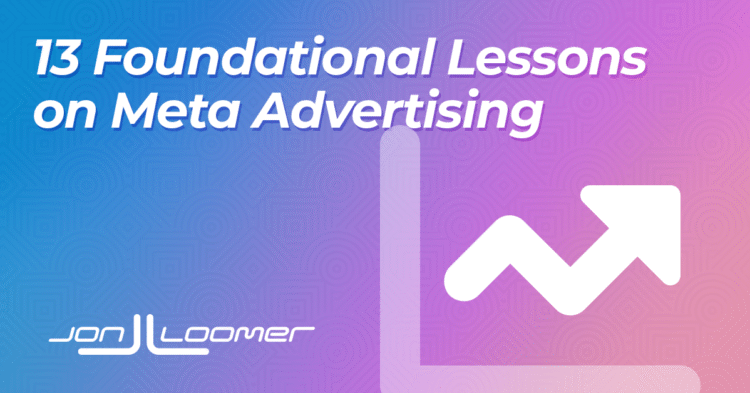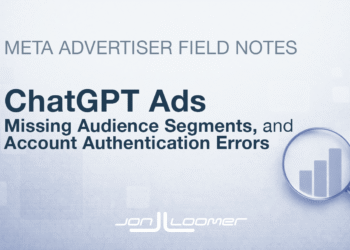Meta advertising has changed at a dizzying rate during the past few years. I assembled this post to get you caught up in the shortest amount of time possible.
This isn’t just about features. We’re talking about how Meta advertising works now and your role in it. Ditching popular and outdated strategies for an approach that gives you the best chance to succeed in today’s environment.
While my podcast (The Pubcast with Jon Loomer) has been around since 2013, it’s come and gone and had various purposes over the years. I brought it back in January to fulfill a very important role: Help explain the foundational topics related to Meta advertising in short, power-packed episodes.
The typical episode is between five and 10 minutes, minus chitchat and tightly edited. If you want to learn a lot about today’s Meta advertising in a short amount of time, the 13 episodes below are an amazing starting point.
You might not get this all done in one day. Bookmark this page and come back later, if necessary.
Let’s get to it…
A Successful Approach to Meta Advertising
1. The Case for Simple Meta Ad Campaigns
I get the allure. We instinctively assume that a complicated Meta ads strategy is more sophisticated, and therefore superior to a simplified approach. But this simply isn’t the case. In fact, unnecessary complications will often make your results worse.
Understand that I haven’t always felt this way (this is a recurring theme) during my 13+ years in Facebook and Meta advertising. In years past, I found every reason to customize and complicate my ad campaigns.
But things have changed. The algorithm has improved. Our options to override the algorithm have been limited. And while the algorithm may be imperfect, our efforts to divert it often fail.
This doesn’t mean that you should always create a single campaign with a single ad set and let it ride (though that may be sufficient in some cases). Instead, I ask that you prioritize keeping things simple. Limit unnecessary campaigns, ad sets, customizations, and other complications when you can.
This episode is central to my recommended approach to advertising in today’s environment.
2. The Four Traits of Successful Advertisers
While advertising has certainly changed significantly during the past 10+ years, I’ve realized that there are four traits that are central to sustained success. Lack even one of these, and you may be in trouble.
Prioritize Simplicity. Hey, a theme! This was covered in the first episode above. Simpler is almost always better. Start there and add complexity where necessary.
Be Willing to Change. I struggled with this one at times. Luckily, I woke up. Advertisers who are frustrated with how things work today are often rigid in their ways and insist on using strategies that worked for them years ago. Be willing to change when the rules around you change.
Learn Mostly from Doing. Resist the urge to adopt strategies and advice from others (even from me!). Your situation is unique. Find what works for your brand, your product, and your budget.
Take Responsibility for Your Results. Advertisers who lack confidence are quick to blame Meta when they don’t get good results. Resist this urge. Let go of anything outside of your control. Understand how things work and focus your time and energy on the things that make the most impact.
3. Stop Blaming Meta for Your Results
I did it again! A seamless transition. Avoid blaming Meta when you aren’t getting the results that you want.
We see this frequently among those who have the least confidence in what they are doing. When results aren’t what they want, they look for external reasons. They look for someone else to blame. This is often how Meta-focused conspiracy theories start — “no one” is getting good results right now, and it must be because of something Meta did.
When you shift away from this frame of mind, you’ll have a much calmer and clearer approach to your advertising.
The Algorithm: How It Works, Strengths, and Weaknesses
4. Understanding How Meta’s Ad Algorithm Really Works
A key to successful advertising is having a thorough understanding how everything works. Central to Meta advertising is the ad delivery algorithm.
How does Meta determine who sees your ads and who doesn’t? What are ways that you can impact it? What are the strengths and weaknesses of the algorithm?
These are all critical questions. I don’t ask that you blindly embrace the algorithm and trust it in all circumstances. There are times when you want to get out of its way. There are also times when it needs guardrails to prevent it from wasting your money.
5. Why Your Performance Goal Changes Everything
When it comes down to it, there is no more important lever an advertiser can pull than the choice of a performance goal. It defines success for the algorithm so that Meta knows how to deliver your ads.
This choice will influence whether you get good or bad results. It will impact quality and quantity of results. And it will be what guides the algorithm on whether a particular combination of ad copy and creative is successful or not — because “success” is based on whether that ad gets the result you defined with a performance goal.
Don’t get cute. If you think you can outsmart the algorithm by using a performance goal that isn’t representative of what you actually want, you’ll almost always get worse results. You may get a higher volume of results, but the quality is what is often the problem.
6. Is Your Campaign Objective Irrelevant?
This is partly a language problem and how advertisers talk about advertising. It’s also a complete misunderstanding of how things work.
The campaign objective, by itself, does close to nothing. It generally tells Meta what you hope to accomplish, but it’s otherwise no more than decoration.
You can use the Sales objective, but select a performance goal that aims to maximize link clicks. Those link clicks and the people you reach won’t be any different than if you had used the Traffic objective. You won’t magically get clicks from people who may buy from you simply because you chose the Sales objective.
Maybe you know this. Many advertisers don’t. Even if you do, I encourage you to change the way you talk about campaign objectives to make it clearer to less experienced advertisers about what is important.
The Evolution of Targeting and Your Role In It
7. When to Use Advantage+ Audience
When Meta introduced Advantage+ Audience, it was a continuation of audience expansion from Advantage Detailed Targeting, Advantage Lookalike, and Advantage Custom Audience. It was the inevitable destination based on a trend.
Meta wants advertisers to rely on algorithmic targeting over manual restrictions of the algorithm. In many cases, Meta is right. But there are exceptions.
There’s also a basic misunderstanding among the vast majority of advertisers who think that turning Advantage+ Audience off gives them more control. While it does in specific situations, it often does not.
This becomes clearer with the new Advantage+ Sales and Advantage+ Leads campaign creation format (which came out after this episode). There are times when advertisers do not have control over targeting, no matter what they do: The algorithm is going to reach the people it wants to reach.
Your job is to understand when this matters and when it doesn’t.
8. Is it Time to Abandon Lookalike Audiences?
Lookalike Audiences are one of the oldest targeting strategies in the advertiser’s toolbox. When they were introduced more than a decade ago, they simplified a complex problem. They helped us reach a broader group of people who were similar to our current customers.
But the question is whether Lookalike Audiences remain relevant. In this episode, I make the argument that they are not.
If used with Advantage+ Audience, a Lookalike Audience is merely a suggestion. If used when optimizing for conversions, any Lookalike Audience is expanded. The result will be the same.
Advantage+ Audience is essentially one, big Lookalike Audience. It’s Meta learning from your pixel activity, conversion data, and prior engagement with your ads to determine who should see your ads. So, what would make a Lookalike Audience any better?
9. Do You Still Need Detailed Targeting?
First, a clarification: Detailed Targeting means the use of interests and behaviors as targeting inputs advertisers use when defining a broader audience of people to reach. Many advertisers seem to think this includes custom audiences and remarketing. It does not.
Meta has de-emphasized the use of detailed targeting during the past few years with the added emphasis on algorithmic targeting. The question is whether any use of detailed targeting remains necessary.
Can it hurt? No. Does it make a difference? That’s unclear. If you’re optimizing for any type of conversion, link click, or landing page view, your detailed targeting is expanded anyway.
10. The New Role of Remarketing
Remarketing was once central to my advertising strategy, so it was painful for me when I came to this realization: Remarketing simply isn’t as important as it once was. In some cases, it’s detrimental.
Understand that I probably spent 90% of my budget on remarketing just a few years ago. I thought Meta needed me to define my ideal audience, so I did that with every custom audience possible. I got amazing results, so I was convinced that this was the secret to advertising success.
But things have changed. The algorithm now prioritizes remarketing even when you don’t explicitly target website visitors or current customers. Results from remarketing are almost always inflated, making advertisers believe their efforts are more amazing than they are.
The biggest problem with remarketing now is that is neither scalable nor incremental. More and more advertisers will begin to understand the lack of incrementality soon with the continued rollout of Incremental Attribution.
It doesn’t mean that remarketing is worthless or that you should never use it. I still use remarketing sometimes. But I look at it far differently than I once did, and you should, too.
Attribution: How Meta Gives Ads Credit for Conversions
11. What You Don’t Know About Meta’s Ad Attribution
Attribution is how Meta gives credit to an ad for a conversion. While most advertisers envision the classic example of someone clicking your ad and going to your website to immediately make a purchase, that’s often not how it works.
Attribution is messy, and one of advertisers’ biggest complaints is that Ads Manager results almost never match up with third-party reporting. While the assumption is often that Ads Manager is wrong, that’s rarely the case (if it actually is wrong, it’s probably due to a problem with your events).
Default attribution is 7-day click and 1-day view. Because of that, far more than the classic “click and immediately convert” scenario can be counted. Not only does a targeted person not need to click your add at all (view-through conversions), but most advertisers have no idea about several types of conversions that can throw off your third-party reporting.
Attribution counts more than immediate conversions. The customer journey can take someone up to seven days and across multiple devices before they convert.
Results don’t always reflect the thing you reported. This is easy to forget. You’re promoting a hat. Someone clicks your ad. While there, they buy something else. As long as the event matches the conversion event defined in your performance goal, it will be counted in results.
A single person can trigger multiple conversion events. For example, someone clicks your ad and buys something today. They then return and buy something four days from now. Assuming you’re using 7-day click attribution, both events will be counted. That’s not necessarily bad, but it’s another reason why Ads Manager is unlikely to match up with third-party reporting.
Click attribution includes non-link clicks. What?? I know! I didn’t realize this for more than 10 years. If someone clicks a static image, opens the post to comment, or likes your ad, that’s considered a click. If they convert within seven days, that will be counted in your results — even though they never clicked the link. I previously assumed this would only fall under 1-day view attribution (and I’m sure many advertisers do, too), but it does not.
12. Should You Count View-Through Conversions?
View-through conversions are controversial among advertisers. There’s no disputing that they’re less valuable than conversions that come from the click. They are potentially problematic if they make up a large percentage of your results. But should you ignore them entirely?
It’s all about understanding context. In this episode, I lay out the issues with view-through conversions, and how you should approach them without disregarding them entirely.
13. The Truth About Meta’s Click Attribution
Some of this was covered in the episode about what you don’t know about attribution, but this one goes deeper into the hidden issues with click attribution. In this episode, I cover…
It doesn’t have to be a straight line. In other words, the customer journey can take multiple days across different devices.
You can still view 28-day click conversions. Before changes resulting from iOS 14, Meta’s default attribution setting was 28-day click and 1-day view. While 28-day click is no longer available as an option in the ad set, you can still view conversions that happen within 28 days of clicking — and it can be very valuable information.
Click attribution includes all clicks. When a reader asked me a question about whether click attribution required a click on a link, I had my baked in assumptions that it did. But when I ran a test to prove it, I was shocked by what I learned.
This episode also goes into how you should approach click attribution results as well as the settings you should use.
Subscribe, Rate, and Review!
If you weren’t already listening to The Pubcast, hopefully this post got you into it. You can listen on my website or from your favorite podcast platform (like Apple Podcasts and Spotify). You can also subscribe to email alerts to be notified when I’ve published a new episode and what it’s about.
And if you dig it, don’t forget to provide a rating and review!



![How to create a social media report [free template included]](https://mgrowtech.com/wp-content/uploads/2026/01/social-media-report-350x250.png)











